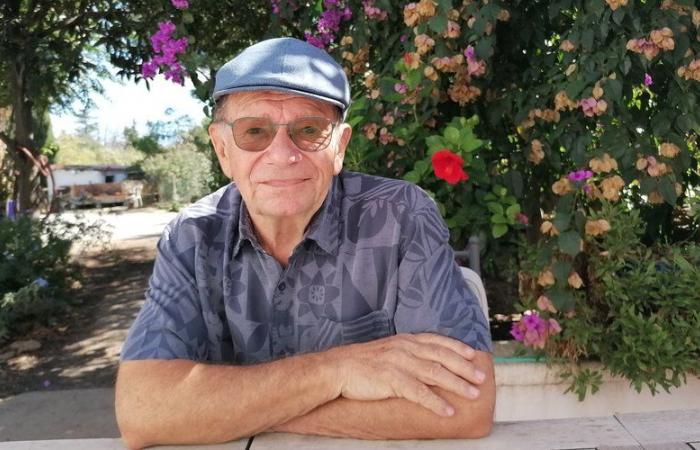
A retired schoolteacher, André Menras has forged unwavering links with Vietnam, which he discovered in 1970 while the war was raging. He published a book on his “50 years of loyalty” to the Vietnamese people.
The breath of resistance. When we tell him, impressed by his biography and his commitments, that he has shown incredible courage, André Menras brushes the argument aside. If he is not “the kind to get out of your way”as he says himself, he just concedes that he has been fighting injustice since his earliest years.
The opportunity, as he has just released his latest book “Vietnam, between the best and the worst – 50 years of loyalty to the fights of my youth” (Les Indes savantes ed.), to return to the journey of this “sons of hard-working peasants, forged by this rough life” from southern Aveyron, now a retired school teacher.
“In the apocalypse and humiliation”
He was 23 years old when, a young teacher recently graduated from the École Normale de Montpellier, he left in 1968, as a volunteer, to practice his profession in Saigon, in Vietnam while the war was raging there. Very quickly, he rejects these “French circles who stank of ending colonialism” and takes a dislike “for these American soldiers who “liberated” the people in the apocalypse and humiliation”.
In his spare time and during school holidays, he travels around South Vietnam on a motorbike, by car and even by fishing boat, while jotting down the memories of his journeys in a small black notebook. Slowly but surely, anger towards the war grew because in South Vietnam too, it was wreaking havoc.
The sacking of a country
“I saw, with my own eyes, throughout southern Vietnam, the systematic sacking of a country, the organized massacre of rural people,” he writes in his work, delivering “his unbearable shame of being a powerless witness” fires, rapes and killings that were taking place.
“We tore people from their villages and put them in camps, without means of subsistence. From a proud people, who were self-sufficient even in poverty, we turned them into people deprived of their dignity, of their culture, who had to beg or prostitute themselves…”
The flag of revolt
So one fine day in July 1970, with a French compatriot, cooperating like him, he brandished the flag “of exasperation and revolt”the standard of the National Liberation Front, by climbing the statue of the two marines, in the heart of Saigon, and throwing leaflets in Vietnamese to demand the withdrawal of foreign troops.
“It was not a political act, in the sense of being affiliated to a party, communist in this case. It was just to give a voice to those who no longer had one and to bear witness to what we had seen to demand peace”.
Two and a half years in prison
Arrested, tried and convicted, André Menras spent two and a half years in prison, in difficult conditions – almost non-existent hygiene or sanitation, beatings… But while establishing unwavering friendships. When he was finally released in December 1972, he returned to France and resumed his teaching profession but without denying any of the links he had forged there.
Mastering the language, “I already spoke a little Vietnamese and I learned to write it to communicate clandestinely in prison”he was received with honors in 2002 by the ruling Communist Party and was the first foreigner to receive Vietnamese nationality from the President of the Republic in 2009.
From hope to disillusionment
But hope quickly gives way to disillusionment when he sees the influence of the Chinese “big brother”, an ogre with limitless appetites, over the Vietnamese state. “As early as 2005, I had significant differences of opinion with the regime because journalists were imprisoned for having denounced corruption or because the government had attributed the monopoly on bauxite exploitation to China”.
His documentary on the widows of the fishermen of the Paracel archipelago, attacked by the Chinese, was also censored on site, just as his writings ended up being. However, André Menras does not want to give up anything. He is the author of the film, “A cry from within”, about the repression of democrats in Vietnam.
A police regime
“It’s a police regime, riddled with corruption and under the influence of Beijing. Once again, people are gagged,” he gets excited. But the country is no longer in the news here. Barely a brief mention of the torrential rains, floods and deadly landslides two weeks ago. Or to be surprised by this influx of Vietnamese refugees in Calais.
Open letter
André Menras has just signed an open letter with 90 Vietnamese academicians, journalists, diplomats and researchers abroad to demand the release of a Vietnamese journalist (Huy Duc), arrested in June 2024 and of whom we have not heard. The petition appeared at the time when the new Secretary General of the Party and President of the Republic arrived in New York, to participate in the United Nations General Assembly from September 22 to 27.
So, at the beginning of November, he will go back there for another documentary. Because despite everything, “like when I was 20, I persist in believing that there is no inevitability to poverty, oppression and unhappiness.”





